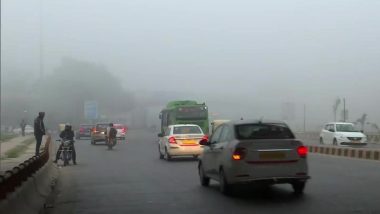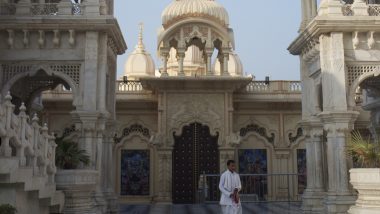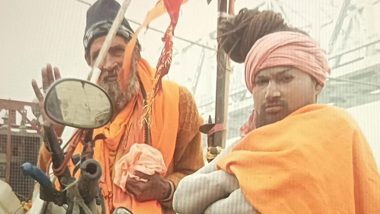New Delhi, December 20: Biting cold gripped north India on Tuesday while dense fog caused several accidents, leaving three people dead and 40 injured in Uttar Pradesh and Haryana, and forcing a change in school timings in Punjab.
Dense to very dense fog engulfed the Indo-Gangetic plains, including Delhi, for the second morning on the trot on Tuesday, lowering visibility to 50 metres in the city and affecting road traffic and train movement. Fog Causes Accidents in North India: Do's and Don'ts for Driving Car or Bike in Low Visibility to Prevent Mishaps.
Flight operations, however, were unaffected in the national capital, an airport official said. On Tuesday, 11 trains were reported running late by one to five hours. Visibility dropped to 50 metres at the Palam and Safdarjung airports in Delhi between 5.30 am and 7 am, an IMD official said. Uttar Pradesh Road Accident: Fog Causes Over Three Dozen Vehicles To Collide With Each Other on Bulandshahr’s Dussehra Flyover, Several Injured (Watch Video).
The Safdarjung Observatory, the primary weather station in Delhi, recorded a minimum temperature of 6.3 degrees Celsius, two notches below normal. The maximum temperature is likely to settle around 22 degrees Celsius.
The minimum and maximum temperatures are likely to drop to five degrees Celsius and 20 degrees Celsius in the next few days in Delhi. Satellite images showed a thick layer of fog over Punjab, Haryana, Delhi, north Rajasthan and Uttar Pradesh in the morning.
One person died and 24 were injured when a bus collided with a truck amid low visibility due to dense fog on the Yamuna Expressway in Greater Noida, police said. The accident took place around 6.30 am in Dankaur area, Deputy Commissioner of Police (Greater Noida) Abhishek Verma said.
A container truck moving ahead of the bus suddenly came to a stop, which caused the bus to crash into it and then hit the the railing along the expressway, he said. In a separate incident, a truck loaded with lentils hit the divider of the highway and overturned in the Dadri area of Greater Noida, police said.
In Bulandshahr, a truck driver was killed and six people were injured in a pile-up involving several vehicles on the Bulandshahr-Aligarh road in Arnia, police said. Around 6 am, the driver of a mini-truck lost control of the vehicle after one of its tyres burst. As a result, a roadways bus, a truck and some small vehicles behind the mini-truck collided with each other, Additional Superintendent of Police (Rural) Bajrang Bali Chaurasia said.
Two of the injured are undergoing treatment in Aligarh and Bulandshahr, the ASP said, adding a few others who sustained minor injuries continued with their onward journey.
In Kaushambi, Nitish (25) was travelling with his friend on a motorcycle when their two-wheeler hit a stationary truck near Sayara overbridge on the Prayagraj-Kanpur road around 9 am due to low visibility, police said. Nitish died in the accident while his friend was referred to SRN Hospital in Prayagraj in critical condition, they said.
Eight people were injured in Sitapur when their van hit a stationary truck due to low visibility, police said, adding four passengers were grievously injured in the accident that occurred near Kalli village under the Misrikh police station area, they said.
According to the in-charge of the Zonal Meteorological Centre in Lucknow, Mohammad Danish, most of the northeastern and southern parts of the state have been witnessing dense fog in the morning and evening.
Taking note of the dense fog and accidents due to it, the Uttar Pradesh government on Tuesday evening stopped plying of state roadways buses at night.
"Due to dense fog and rising mishaps, the government has stopped plying of Uttar Pradesh Road Transport Corporation (UPSRTC) buses at night. An order has been issued in this regard to regional managers of the corporation," Transport Minister Dayashankar Singh told reporters on sidelines of a programme.
He however did not elaborate on the new timings of the plying of buses.
Dense fog on Tuesday morning reduced visibility in most parts of Haryana and Punjab too, affecting traffic movement.
Two police vehicles, which were part of Haryana Deputy Chief Minister Dushyant Chautala's cavalcade, met with an accident on the Hisar-Sirsa Highway, police said. A bodyguard sustained injuries. They said all others, including Chautala, were safe.
The deputy chief minister was travelling from Hisar to Sirsa on Monday night when the accident took place due to dense fog, police said. Punjab Chief Minister Bhagwant Mann announced that all schools in the state will open at 10 am from December 21 till January 21 due to foggy weather.
"In view of the safety of school students and teachers because of dense fog in the state, the timing of government, aided, recognised and private schools will be 10 am from 21-12-2022 to 21-01-2023,” said Mann in a tweet. At present, schools start at 9 am and close at 3 pm.
In Haryana, cold weather conditions prevailed in Narnaul, which recorded a low of 4.5 degrees Celsius. The minimum temperature in Hisar settled at 6 degrees Celsius, according to a meteorological department report. In Punjab, Bathinda was the coldest place with the mercury settling at a low of 3.4 degrees Celsius.
Amritsar also experienced a cold night with a low of 6.8 degrees Celsius
Chandigarh, the common capital of the two states, recorded a low of 7.6 degrees Celsius. The weather department said cold wave to severe cold wave conditions are likely at isolated places in Haryana and Punjab while dense to very dense fog is likely at most places over the next 4-5 days.
Meanwhile, cold wave across Kashmir intensified on Tuesday as the temperatures fell several degrees below the freezing point, a day ahead of 'Chilla-i-Kalan', the 40-day harshest winter period, officials said.
The minimum temperature in Srinagar recorded last night was minus 3.4 degrees Celsius, while Gulmarg resort in north Kashmir's Baramulla district recorded a low of minus 4.0 degrees Celsius, they said.
The meteorological department has forecast colder nights over the next couple of days as further fall in the minimum temperature is expected. There is possibility of rains or light snowfall in some parts of Kashmir around Christmas.
The ‘Chilla-i-Kalan' is the 40-day harshest winter period when a cold wave grips the region and the temperature drops considerably leading to the freezing of water bodies, including the famous Dal Lake here as well as the water supply lines in several parts of the valley.
While ‘Chillai-Kalan' begins on December 21, it will end on January 30. The cold wave continues even after that in Kashmir with a 20-day-long ‘Chillai-Khurd' (small cold) and a 10-day-long ‘Chillai-Bachha' (baby cold).
(This is an unedited and auto-generated story from Syndicated News feed, LatestLY Staff may not have modified or edited the content body)













 Quickly
Quickly





















